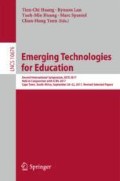Abstract
The study aims at designing an augmented reality interaction game to realize its usability, user interaction satisfaction, and the behavioral differences among users with different cognitive styles. The research tools used here are Study Preference Questionnaire (SPQ), Questionnaire for User Interaction Satisfaction (QUIS), System Usability Scale (SUS), and Sequence Analysis. The research subjects are 52 seventh graders of some junior high. Research has found that, both the 17 students categorized as with Holist Cognitive Style, and the 35 with Serialist Cognitive Style have high, positive usability and interaction satisfaction with our system. In terms of behavior, the serialist testees operate and familiarize themselves with the system first before another problem comes. In the state where written words are used as a means of communication, many learners answer correspondingly as they observe the way this system has given them feedback. The holist cognitive testees ask and operate simultaneously. Most testees, however, deliberately give wrong answers to observe how the system gives feedback.
Access this chapter
Tax calculation will be finalised at checkout
Purchases are for personal use only
References
Asai, K., Kobayashi, H., Kondo, T.: Augmented instructions-a fusion of augmented reality and printed learning materials. In: 5th IEEE International Conference on Advanced Learning Technologies, ICALT 2005, pp. 213–215. IEEE, July 2005
Bakeman, R., Gottman, J.M.: Observing Interaction: An Introduction to Sequential Analysis. Cambridge University Press, Cambridge (1997)
Braghirolli, L.F., Ribeiro, J.L.D., Weise, A.D., Pizzolato, M.: Benefits of educational games as an introductory activity in industrial engineering education. Comput. Hum. Behav. 58, 315–324 (2016)
Brooke, J.: SUS-A quick and dirty usability scale. Usabil. Eval. Ind. 189(194), 4–7 (1996)
Chin, J.P., Diehl, V.A., Norman, K.L.: Development of an instrument measuring user satisfaction of the human-computer interface. In: Proceedings of SIGCHI Conference on Human Factors in Computing Systems, pp. 213–218. ACM (1988)
Clarke, J.: Cognitive style and computer-assisted learning: problems and a possible solution1. Assoc. Learn. Technol. J. 1(1), 47–59 (1993)
Dickey, M.D.: Game design and learning: a conjectural analysis of how massively multiple online role-playing games (MMORPGs) foster intrinsic motivation. Educ. Tech. Res. Dev. 55(3), 253–273 (2007)
Dorji, U., Panjaburee, P., Srisawasdi, N.: A learning cycle approach to developing educational computer game for improving students’ learning and awareness in electric energy consumption and conservation. Educ. Technol. Soc. 18(1), 91–105 (2015)
Ford, N.: Learning styles and strategies of postgraduate students. Br. J. Educ. Technol. 16(1), 65–77 (1985)
Ford, N., Chen, S.Y.: Individual differences, hypermedia navigation and learning: an empirical study. J. Educ. Multimedia Hypermedia 9(4), 281–312 (2000)
Ford, N., Chen, S.Y.: Matching/mismatching revisited: an empirical study of learning and teaching styles. Br. J. Educ. Technol. 32(1), 5–22 (2001)
Hou, H.T., Chang, K.E., Sung, Y.T.: Analysis of problem-solving based online asynchronous discussion pattern. Educ. Technol. Soc. 11(1), 17–28 (2008)
Ke, F.: A qualitative meta-analysis of computer games as learning tools. In: Handbook of Research on Effective Electronic Gaming in Education, vol. 1, pp. 1–32 (2009)
Kebritchi, M., Hirumi, A., Bai, H.: The effects of modern math computer games on learners’ math achievement and math course motivation in a public high school setting. Br. J. Educ. Technol. 38(2), 49–259 (2008)
Mampadi, F., Chen, S.Y., Ghinea, G., Chen, M.-P.: Design of adaptive hypermedia learning systems: a cognitive style approach. Comput. Educ. 56(4), 1003–1011 (2011)
Messick, S.: Individuality in Learning, pp. 4–23. Jossey-Bass, San Francisco (1976)
Papastergiou, M.: Digital GBL in high school computer science education: impact on educational effectiveness and student motivation. Comput. Educ. 52(1), 1–12 (2009)
Pask, G.: Styles and strategies of learning. Br. J. Educ. Psychol. 46(2), 128–148 (1976)
Saracho, O.N.: Research directions for cognitive style and education. Int. J. Educ. Res. 29, 287–290 (1998)
Wu, W.H., Chiou, W.B., Kao, H.Y., Hu, C.H.A., Huang, S.H.: Re-exploring game-assisted learning research: the perspective of learning theoretical bases. Comput. Educ. 59(4), 1153–1161 (2012)
Author information
Authors and Affiliations
Corresponding author
Editor information
Editors and Affiliations
Rights and permissions
Copyright information
© 2017 Springer International Publishing AG
About this paper
Cite this paper
Tsai, MC., Lin, HCK. (2017). A Study on the Behavioral Patterns Formed by Subjects with Different Cognitive Styles in Playing Augmented Reality Interaction Games. In: Huang, TC., Lau, R., Huang, YM., Spaniol, M., Yuen, CH. (eds) Emerging Technologies for Education. SETE 2017. Lecture Notes in Computer Science(), vol 10676. Springer, Cham. https://doi.org/10.1007/978-3-319-71084-6_42
Download citation
DOI: https://doi.org/10.1007/978-3-319-71084-6_42
Published:
Publisher Name: Springer, Cham
Print ISBN: 978-3-319-71083-9
Online ISBN: 978-3-319-71084-6
eBook Packages: Computer ScienceComputer Science (R0)

